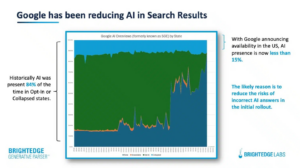During the annual Google I/O software conference on May 14, the highly anticipated feature, AI Overview, was unveiled by the search engine giant. This feature, currently only available in the US, is set to revolutionize how we search for information on Google.
Google has already announced plans to extend AI Overview to a global audience of up to one billion users by the end of the year.
Table of Contents
What is AI Overview?
In short, AI Overview will crawl and summarize information from pages all over the web and give the user a concise answer to their question directly below the search box in the form of a rich snippet. In addition, Google also plans to expand this feature with multi-purpose searches, meaning AI Overview has the capacity to radically change the layout of the SERP based on what kind of search is being performed.
For example, if you search for a trip to Italy, you would previously need seven different searches to find hotels, experiences, restaurants, etc. Google aims to cover all these answers in one search using AI. This means that organic searches are prioritized for Google’s AI recommendations. Seemingly, Google is attempting to deliver a “search experience” instead of the classic list of relevant websites.
What consequences will this have for SEO?
Many have been known to quickly resort to doomsday prophecies, but is the fear of AI Overview even valid?
There are worries that a “one-stop shop” solution for all questions on Google could put a spanner in the works of SEO agencies’ strategies. Some in the SEO industry have called the rollout of AI Overview “the most groundbreaking development in Google’s history”. They point out that AI Overview could threaten the entire ecosystem of content producers that rely on traffic from users seeking information, reviews, and other human-generated content.
The criticism is that Google is skimming profits from the hard work of others while making them redundant. In an article published by WIRED on June 5th, a journalist reports how Google has used content from his articles in AI Overview, while simultaneously downgrading his content in the search results.

This can ultimately lead to a paradigm shift from the well-known SEO strategy of creating valuable content for users to click through to your website. If AI Overview delivers all the answers at the top of the search engine, users potentially have no incentive to click through to your website, and your click-through rate could drop significantly. So what is the point of spending resources on blog posts and other informative material?
On the other hand, AI Overview has also been ridiculed by users and experts who have questioned whether it is reliable and functional.
Many internet users have been amused by the viral “AI Overview fails” and have already condemned the feature as a futile project. AI Overview has suggested that drinking poison is healthy, women can smoke while pregnant, and that people suffering from depression should jump off a bridge. Some experts believe that the future does not look bright for the project either, as there are no known solutions to a language model that spits out bizarre answers.

How should you respond to AI Overview?
As this is a new development, it is important to be cautious and not make drastic changes to your SEO strategy until an overall view of AI Overview’s impact has been formed. Hyped trends can trigger unnecessary panic in the world of SEO, as we have seen before with voice searches and built-in flight and hotel searches. There are also signs that Google has partially rolled back the feature, possibly in response to its controversial unreliability.
AI results used to appear in 84% of searches, but now they only appear in just 15%. At Klikko, we also suspect that AI Overview will have the most impact on informational searches, where the user is looking for knowledge about something, and to a lesser extent on transactional searches, where the user intends to buy something. And ultimately, searches with a purchase intent are the most impactful “on the business side of things.”

That said, it is a good idea to ensure you have your structured data under control, as this is the future for Google. The key is to make it easy for Google to understand the content on your website through solid structured data so that they recommend your site in AI Overview. In addition, you can also benefit from paying close attention to when experts assess what kind of data is used to generate AI recommendations and adapt accordingly.
If you are wondering how to tackle Google’s new initiatives and find it difficult to keep up with all the new developments in the world of SEO, we are ready to help you. Contact us today for a free consultation, and let’s make sure you are prepared and ready for the future.


